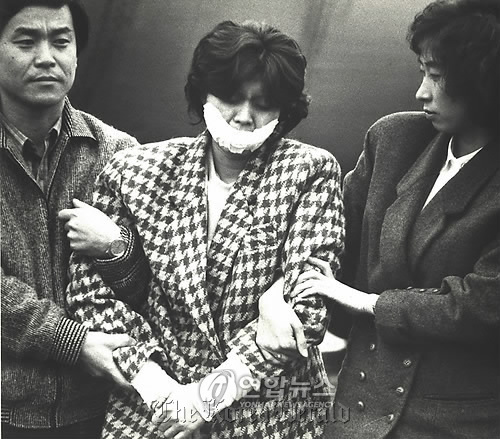U.S. found N. Korea behind 1987 KAL bombing: dossier
By Korea HeraldPublished : July 19, 2012 - 20:28
WASHINGTON (Yonhap News) ― The U.S. government conducted its own investigation into the mid-air bombing of a South Korean jet in 1987 and concluded it was an act by North Korea, a set of declassified State Department documents shows.
U.S. government officials interrogated Kim Hyun-hui, a self-confessed North Korean terrorist responsible for the bombing of Korean Air 858, which killed 115 people, shortly after the incident in November 1987, according to the dossier.
Kim, traveling with a fake Japanese passport through Europe, made a failed attempt to commit suicide shortly before being arrested. She is now living in South Korea as a housewife.
U.S. government officials interrogated Kim Hyun-hui, a self-confessed North Korean terrorist responsible for the bombing of Korean Air 858, which killed 115 people, shortly after the incident in November 1987, according to the dossier.
Kim, traveling with a fake Japanese passport through Europe, made a failed attempt to commit suicide shortly before being arrested. She is now living in South Korea as a housewife.

“In a situation we controlled Ms. Kim picked out the photographs of 3 North Koreans who had contacted her under alias in Belgrade and Budapest, 2 in Belgrade one in Budapest,” read a diplomatic cable sent from the U.S. Embassy in Seoul to Washington in February 1988. It is among 57 documents posted in June on the department’s website.
“Then 3 photographs were picked out of a collection of 26 shown her. In each case the individual she picked was in fact the photograph of a North Korean investigation department agent posted in that city at the time she was there,” it added. “We consider that part of the compelling independent evidence that she was working for North Korea.”
The document also showed that a bureau affiliated with the U.S. Central Intelligence Agency carried out a linguistic analysis of Kim’s statement, “which demonstrates that the words she used are North Korean (dialect).”
The Foreign Broadcast Information Service was run by the CIA from 1941 to 2004.
South Korean officials also “strongly suspected” North Korea’s involvement from the beginning of their probe and reached the same conclusion, another document shows.
But the South Korean government, led by iron-fisted President Chun Doo-hwan, did not consider military retaliation, according to the document.
“Chun went on that he would rule out military retaliation at that time,” James Lilley, who served then as U.S. ambassador to Seoul, said in a cable sent in January 1988.
Chun was quoted as saying, “South Korea was in the course of a political transition and had to host the Olympics.”
In his comments attached, Lilley said, “There are Koreans who favor military retaliation but emphatic that Korea would not undertake any military action in the short term.”
In South Korea, there is a lingering controversy over the KAL case.
Some still claim that the Chun administration might have orchestrated the bombing itself to influence the presidential elections in December 1987.
In 1988, meanwhile, the U.S. blacklisted North Korea as a state sponsor of terrorism on the basis of the KAL incident.
Washington removed Pyongyang from the list in 2008 in return for its initial move towards denuclearization.
-
Articles by Korea Herald


![[Weekender] Geeks have never been so chic in Korea](http://res.heraldm.com/phpwas/restmb_idxmake.php?idx=644&simg=/content/image/2024/05/16/20240516050845_0.jpg&u=)
![[News Focus] Mystery deepens after hundreds of cat deaths in S. Korea](http://res.heraldm.com/phpwas/restmb_idxmake.php?idx=644&simg=/content/image/2024/05/17/20240517050800_0.jpg&u=)



![[KH Explains] Why Korea's so tough on short selling](http://res.heraldm.com/phpwas/restmb_idxmake.php?idx=644&simg=/content/image/2024/05/19/20240519050115_0.jpg&u=20240519162247)

![[Herald Interview] Byun Yo-han's 'unlikable' character is result of calculated acting](http://res.heraldm.com/phpwas/restmb_idxmake.php?idx=644&simg=/content/image/2024/05/16/20240516050855_0.jpg&u=)









